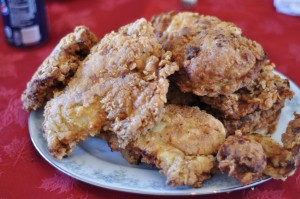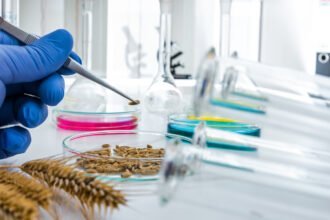
Fried Chicken- a favorite- this nicely prepared by my good friend Dolce Debbie

Fried Chicken- a favorite- this nicely prepared by my good friend Dolce Debbie
Simple thinking: if I eat fat, and I get fatty liver disease, then it must be the fat that caused the fatty liver. Turns out that human beings are not that simple. It was that same simplistic thinking that led to: if I eat fat, and have fat in my arteries, then it must have been the fat that I ate that caused this- so I should eat less fat.
Think carbohydrates for fatty liver disease, not fried foods. In a recent study of eating fast foods it was noted that there was increased obesity and fatty liver disease. Fatty liver disease can lead to liver cirrhosis, and death, or the need for a liver transplant.
But here the media can take comments out of context often leads to misinformation; in this case when CBS quoted Dr. Ordon from “The Doctors” from the CBS web page:
“The Doctors” revealed study findings that found regular consumption of fast food items like fried chicken and onion rings are particularly bad for your liver, and these fried foods have many surprising complications and dangers for the people that consume them.
“The amount of fat and saturated fats creates a condition called fatty liver,” said Ordon.
What’s interesting about the new information is that even after just a month of consistently eating fatty foods from fast food restaurants, there are significant changes in your liver. The fried foods do not just impact your cholesterol and waist line.
Ordon describes the changes in the liver enzymes as being surprisingly similar to the damage that is seen by hepatitis, which can ultimately lead to liver failure.
Reading this leads to the erroneous conclusion that eating fatty foods leads to fatty liver. With few exceptions, fatty liver disease starts with obesity. Among obese individuals some have the propensity of some obese to deposit excess weight in the liver which leads to fatty liver disease, which can lead to cirrhosis and death.
Fatty liver disease has less to do with dietary fat, and a lot to do with how the liver processes carbohydrates, and more to do with obesity. While “The Doctors” took basic biochemistry in medical school, it is difficult to explain biochemical pathways like the Kreb’s Cycle.
The cause of fatty liver disease is not fats -as easy as that would be to guess. The deposition of fat into the liver comes primarily from carbohydrates.
Here is the evidence:
When giving patients high glucose in their intra-venous fluids, surgeons discovered that their liver enzymes continued to rise. When the livers were biopsied they discovered that the patients had fatty liver. Ultimately, when surgeons then added lipids to the intra-venous nutrition, the liver enzymes stopped rising. Ultimately it was discovered that to PREVENT fatty liver disease, there must be a BALANCE, where lipids are added to the intra-venous solution. High glucose alone gave fatty liver disease.
We have written about fructose, as one of the bad actors in carbohydrates ( see here) . It is difficult to isolate fructose consumption in humans and seeing what fructose effects without relating it to consumption of excess calories. In a short (2 wk) dietary intervention study in fatty liver subjects, Browning (reference below) showed that carbohydrate restriction (< 20 g/d) was significantly more effective in reducing fatty liver content than just restricting calories to 1200-1500 kca Both diet interventions reduced body weight by the same amount (by about 4.3%). In a randomized intervention study comparing the consumption of sucrose-sweetened beverages (1 L/d for 6 mo) with other isocaloric beverages in obese subjects, Maersk (reference below) demonstrated that sucrose (half glucose and half fructose )significantly increased fatty deposition, not only in liver, but also in skeletal muscle and in the belly.
MONITORING FATTY LIVER DISEASE
In some of my weight loss surgery patients we monitor their liver fat by checking with ultrasound. The ultrasound gives us a non-invasive way of seeing if their liver has more fat in it. If they have been avoiding “junk” foods, and loose weight we can see a decrease in the liver fat over time. If, on the other hand, they have gained weight, and we see that there is an increase in liver fat, when we check their diet journals it is often that their consumption of fructose has increased (usually from soda, juices, or other processed foods that have high fructose corn syrup).
REFERENCES:
Browning JD, Baker JA, Rogers T, Davis J, Satapati S, Burgess SC. Short-term weight loss and hepatic triglyceride reduction: evidence of a metabolic advantage with dietary carbohydrate restriction. Am J Clin Nutr. 2011;93:1048–1052. [PMC free article] [PubMed]
Maersk M, Belza A, Stødkilde-Jørgensen H, Ringgaard S, Chabanova E, Thomsen H, Pedersen SB, Astrup A, Richelsen B. Sucrose-sweetened beverages increase fat storage in the liver, muscle, and visceral fat depot: a 6-mo randomized intervention study. Am J Clin Nutr. 2012;95:283–289. [PubMed]







